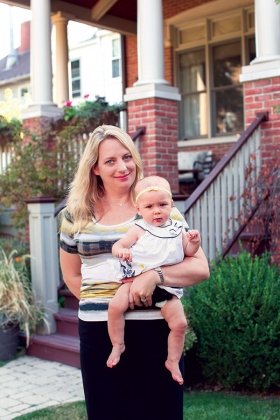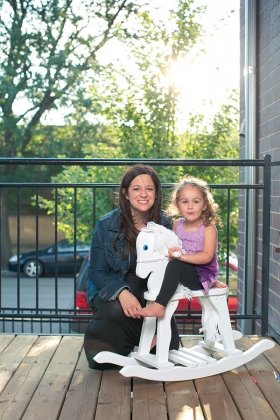
At 39, Kristy Kitzmiller of Lincoln Square had everything she wanted: a baby girl, Madeleine, and a new business, Table Host LLC, a last-minute reservation system.
Four days after her daughter was born, Ms. Kitzmiller was back to work answering emails. That’s because, as any business owner knows, it’s basically impossible to take time off, especially if your company is still in its infancy, too.
How did she manage it? Unlike most new moms, Ms. Kitzmiller was sleeping through the night as a nurse or helper tended to the baby, at a cost of $25 to $35 an hour.
While night nurses, night nannies and night sitters—all forms of helpers who take care of babies during the evening hours so new moms can get some rest—have been around forever, it appears that more and more women are taking advantage of them.
When Pam Jones, a registered nurse, co-founded Chicago-based Sweet Dreams Infant Care four years ago, she started with 10 employees. Now she has 40 women working for her and is booked solid.
She attributes some of her success to word of mouth. But she also says that a large chunk of her popularity is due to women having babies later when they’re enmeshed in their careers—and don’t want to give it all up because they’re sleep-deprived.

Eighty percent of Ms. Jones’ clientele are businesswomen between the ages of 32 and 42. Even if they are officially taking a full 12-week maternity leave, Ms. Jones says nearly all are unofficially working from home long before they return to work.
“I get there at 9 p.m., and they’re there at 11 p.m., midnight doing emails, and they’re exhausted,” Ms. Jones says of her clients. “I have to put these poor moms to bed. I say, ‘No emails or TV after 10 p.m.’ They feel like they have to stay on top of it. Gone are the days when we have 12 weeks off work, and now my clients feel like they have to stay on top of their jobs.”
Every night at 7:30, a helper supplied by Sweet Dreams took charge of Ms. Kitzmiller’s baby. Throughout the night, Madeleine was given bottles of pumped breast milk; the helper treated the baby’s acid reflux, changed diapers, washed bottles and rocked little Madeleine back to sleep so that everyone was rested when the sun came up.
Ms. Kitzmiller employed the helper seven nights a week for the first five months of Madeleine’s life. The helper stayed for about 11 hours a night at first, but when Madeleine started sleeping better, the hours were reduced to 10 a night.
“There’s no question that knowing the night nurse would be coming made me a better business person and a better mom,” Ms. Kitzmiller says. “It’s so much easier to be patient when you’ve had a full night’s rest. And if I knew that she was coming at 7:30, I knew I could work from 7:30 to midnight and still sleep from 12 to 6. I tell all my friends to save their pennies and get a night nurse.”
Many of them already are—some when they’re only a few weeks pregnant. Karen Laing, president and founder of Chicago-based Birthways, which provides postpartum day and overnight support services, recommends women book by the time they’re 27 weeks pregnant.
Ms. Laing sends night nurses and doulas (women who provide support during childbirth and for new mothers) to about 20 mothers a month, and she’s so swamped with requests for night help that she has a waiting list for many dates.
“We dipped during the recession from 2008 to 2010 and found that clients weren’t planning ahead, and they were calling us only during a sleep crisis,” she says. “But now they’re planning ahead again, and we’re reserved until 2014.”
With business booming, more such services are popping up. Laura Bangart has been a neonatal night nurse for more than 20 years and had been dabbling in night nursing in private homes for more than a decade. Last year, she cut back her hospital hours and formed her own business, Babies Only Chicago, which provides registered night nurses.
“The work issue is a big thing, but another issue is that people are paying attention to how important sleep is—not only for the baby but also for the mom,” she says. “Breastfeeding is a big thing now, and you can’t really breastfeed if you’re exhausted because you can’t produce enough milk.”

Another not-so-recent trend spurring the growth of night nurses is that many people don’t live close to their families, as once was common, so they’re using night nurses as replacement grandmothers, says Kenneth Polin, a pediatrician at Town & Country Pediatrics in Glenview.
“People used to live around the corner from their parents, and that’s become less and less available,” he says. That, combined with the fact that 60 to 70 percent of the mothers of his patients get only six to 12 weeks to recover from a birth, almost necessitates additional help overnight.
There’s no question that night nurses are becoming more popular, says Lindsay Pinchuk, CEO of Bump Club & Beyond, a social event company based in Chicago catering to pregnant women and new moms. Ms. Pinchuk says that when she features speakers from night-nurse services at her events, they’re often mobbed by pregnant women who had never heard of the service. “This opens their eyes to their options,” she says.
She knows how they feel.
Ms. Pinchuk gave birth to her daughter seven months after starting Bump Club. Her own night nurse came every night for two weeks. Within a week of giving birth, she was responding to Bump Club emails.
“I would take a night nurse over fancy furniture or a fancy stroller any day,” she says, adding that she plans to do the same when she has a second baby.
